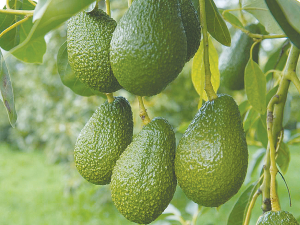A new report by Rabobank says global avocado trade will continue to grow in the next few years, but the market will be more competitive.
The Global Avocado Growth Far From Over report says global production expanded by a compound annual growth rate (CAGR) of about 7% during the past decade to 8.4m tonnes. Meanwhile, production in Mexico - currently accounting for 30% of global avocado output - grew by a CAGR of 6%.
In Colombia (12% of global production), Peru (9%), and Kenya (6%) production increased over the decade by a CAGR of approximately 15, 12, and 11% respectively.
Among the next largest exporters, Peru, Spain, and Kenya expanded by a CAGR of 22, 6, and 15% respectively between 2012 and 2022. These country mainly supply the European market.
On the other hand, the US - among the world's largest avocado-producing countries in 2012 - dropped in the ranking and is no longer a top 10 producer.
Increased production in countries with complementary harvesting seasons has allowed year-round availability in key markets, including the US, EU, and Asia.
Cindy van Rijswick, Rabobank global strategic fresh produce, says attractive prices and returns during that period were relevant drivers to expanding production in key regions.
"With exports increasing at an average annual growth rate of around 8% over the past decade, Mexico reaffirmed its place as the largest avocado-exporting country in the world, surpassing 1m tonnes in 2022," she explains. "We believe there is room for significant growth in several markets around the world, a per capita consumption is highly variable."
Globally, the US remains the largest destination market, with imports increasing by a CAGR of about 8% from 2012 to 2022. Behind the US, the largest avocado importers between 2012 and 2020 were the Netherlands, Spain and France, with respective CAGRs of 14, 20, and 8%.
The global commercial market value of fresh avocados is estimated to be around US$18 billion in 2022.
Sustainability concerns remain on the agenda for avocado producers, particularly water usage. Because of this, Rabobank says avocado growers have invested in advanced irrigation systems to improve water efficiency.
Despite the growth in market diversification in recent years, Rabobank associate analyst Pia Piggott says 2022 brought volatility to the global economy which weighed on demand for avocados.
"Weakening currencies in Asia, higher prices and increased refrigerated container rates were not supportive for New Zealand avocado demand. We expect some of these headwinds to continue in 2023."
A combination of sufficient supply in Australia, decreased demand from Asian destinations and fewer export quality fruit saw New Zealand export volumes drop 20% in 2022. Meanwhile, production was affected by significant wet weather events causing waterlogged soil, poor pollination and an above average reject rate.
"We expect the 2023 season to bring lower production followed by a bumper crop in 2024," Piggott adds. "With plenty of production growth expected in the next few years, rebuilding market share in Asia will be a priority for securing demand."


















